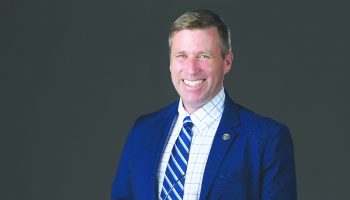Welcome to Week Two of our Summer Assembly. Since announcing our 2024 season, there has been one week in particular that has captured the imagination of Chautauquans, and it comes this week with the theme of “The AI Revolution.”
Artificial intelligence has loomed large in cultural consciousness for more than a century, primarily relegated to speculative works of fiction. Technology is now seeing exponential growth and adoption, accelerating the need for answers to questions posed by novelists and scientists — questions of ethics, of law, of nature. With AI no longer niche and imagined, but mainstream and real, what will we do with the tools it offers us for efficiency and creation? How do we balance risk with opportunity? Can artificial intelligence evolve into artificial humanity, or can it allow for humans to be more human?
We wracked our brains on how we could possibly unpack this important topic in five lectures, and, no, we didn’t ask ChatGPT to do it for us! We’re grateful to our guides this week, who include Joanna Stern, senior personal technology columnist at The Wall Street Journal. She opens our week with an up-to-the-minute primer on how artificial intelligence has developed ever-more-rapidly and considers where we may be headed as these remarkable and potentially dangerous technologies continue to evolve. On Tuesday, Conrad Tucker — who serves as both the Arthur Hamerschlag Career Development Professor of Mechanical Engineering at Carnegie Mellon University and commissioner of the U.S. Chamber of Commerce AI Commission on Competitiveness, Inclusion and Innovation — will help us to understand, from an engineer’s perspective, the actual mechanics of AI and the large language models that drive it: how they were constructed, how they work, and what their potential is — both good and bad. On Wednesday, two stewards of Hollywood family legacies — Kelly Carlin and Joely Fisher — will appear together in conversation to discuss how AI is impacting the creative community, the threats posed to artists, their livelihoods and their legacies, and the opportunities presented by ethically incorporating AI into creative work. Carlin is an author and television producer, and Fisher is an actor, director, author, and secretary-treasurer of SAG-AFTRA. Andrew Steer, the president and CEO of the Bezos Earth Fund, joins the Chautauqua Lecture Series on the Fourth of July to share details about the Bezos Earth Fund’s newly announced AI for Climate and Nature Grand Challenge, which will award up to $100 million in grants to explore how modern AI might help address climate change and nature loss. Andrew will join me and John Kelly, former executive vice president of IBM and the “father of Watson” in a master class on that same day in Norton Hall. We wrap up the week with Jamie Metzl, one of the world’s leading technology and healthcare futurists, with a discussion of his latest book: Superconvergence: How the Genetics, Biotech, and AI Revolutions will Transform Our Lives, Work, and World.
In our companion Interfaith Lecture Series, we look at “Religion’s Intersections: Interdisciplinary Imagination with Science, Technology, and AI.” Leading off this series is Nicholas Carr, author of the Pulitzer Prize-nominated book, The Shallows: What the Internet Is Doing to Our Brains.
We also welcome Margarita Simon Guillory, associate professor of religion and African American studies and inaugural associate director of digital humanities at Boston University; Sigal Samuel, senior reporter for Vox; and Sylvester A. Johnson, associate vice provost for public interest technology and executive director of the Tech for Humanity initiative at Virginia Tech. We conclude the series with Matthew B. Crawford, senior fellow at the University of Virginia’s Institute for Advanced Studies in Culture.
We offer a special welcome to the chaplain of the week, Bishop Cynthia Moore-Koikoi, resident bishop of the Pittsburgh Episcopal Area and one of the assigned bishops of the Harrisburg Episcopal Area. We look forward to her pastoral presence and her prolific preaching.
We look forward to welcoming our Chautauqua Literary and Scientific Circle author Martha Brockenbrough for a talk on the week’s CLSC selection, Future Tense: How We Made Artificial Intelligence—and How it Will Change Everything. That sounds like an excellent primer for the week!
Of course, Week Two brings us Independence Day, and no one does the Fourth of July like Chautauqua. We look forward to the traditional picnic and concert on Bestor Plaza – highlighted by the Children’s School Parade, as well as the Chautauqua Symphony Orchestra’s concert under the baton of Principal Pops Conductor Stuart Chafetz. We also encourage your engagement in the Chautauqua Theater Company New Play Workshop, Tell Me You’re Dying, the Chautauqua Opera Company performances of Love and Longing by the Lake, the opening of our 2024 School of Art Faculty Exhibition and so much more!
As we look at the second week of our 150th anniversary season, I cannot help but express gratitude for the rich experiences of Week One. From the moving words of Fr. Greg Boyle to our lectures on the American presidency and rich performing arts and enriching recreational experiences, the week represented a robust exploration. It was a particular joy to introduce and celebrate our inaugural Chautauqua Perry Fellows in Democracy, Melody Barnes and David French. And wasn’t it timely that we conducted this conversation in alignment with the first presidential debate? It’s magical when Chautauquans are exploring a topic that is in the headlines in real time.
Thanks, also, to all who helped us celebrate the public launch of Boundless, A Campaign for Chautauqua through a special event on the Amphitheater stage. Chautauquans have been so generous, and it was a joy to lift up so many stories of success.
Welcome to Week Two, Chautauqua. While we are exploring AI this week, I cherish that we do this not in an artificial space, but in an authentic and beautiful community full of humanity.


